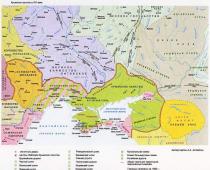There is a month in the sky - and night
The shadow has not yet moved,
Reigns over himself without realizing it,
That the day has already started up, -
Which is at least lazy and timid
Beam appears after ray,
And the sky is still completely
At night it shines with triumph.
But two or three moments will not pass,
The night will evaporate over the earth,
And in the full splendor of manifestations
Suddenly the world of daytime will embrace us...
Other editions and options
1 The night shadow did not move -
2 The moon is shining high in the sky,
3 Reigns over himself - and won’t notice
4 That young Day has already been born
9-12 Stanza missing
Autograph - RGALI. F. 505. Op. 1. Unit hr. 35. L. 2;
Ed. St. Petersburg, 1886. P. 234.
COMMENTS:
Autograph (early edition) - RGALI. F. 505. Op. 1. Unit hr. 35. L. 2.
List (late edition) - RGALI. F. 505. Op. 1. Unit hr. 35. L. 80–80 vol.
First publication - Citizen. 1872. No. 1 of January 3. P. 9. Included in Ed. St. Petersburg, 1886. P. 234; Ed. 1900. P. 235.
Printed according to the list.
In the autograph, before the text of the note: “December. 8 am". The poem consists of two stanzas.
The list shows a later edition of the poem. The text is written in pencil and then in ink. A. A. Nikolaev believes that the pencil autograph was written by the hand of D. I. Sushkova (1806–1879), née Tyutcheva, the poet’s sister (see: Ed. 1987. P. 403). Title: “December Morning”, at the bottom of the note: “F. Tyutchev." The poet revised the first stanza and added a third. In its content, it contrasts with the first and second: the queen night suddenly “evaporates”, and the timidly awakening day appears “in the full splendor of its manifestations.” In both the autograph and the list, the word “Day” is capitalized. In the list, the words “Heaven” (1st, 7th lines) and “Earth” (10th line) are also written in capital letters.
Fyodor Ivanovich Tyutchev
There is a month in the sky - and night
The shadow has not yet moved,
Reigns over himself without realizing it,
That the day has already started up, -
Which is at least lazy and timid
Beam appears after ray,
And the sky is still completely
At night it shines with triumph.
But two or three moments will not pass,
The night will evaporate over the earth,
And in the full splendor of manifestations
Suddenly the world of daytime will embrace us...

Tyutchev's lyrical hero is captivated by the contemplation of the transitions and changes taking place in the living world. Noticing the “complete consonance in nature” in short-term and long-term transformations, the observer strives to see “grace”, to touch the innermost essences hidden from man.
In the winter of 1859, a poem was created dedicated to the late December dawn. The dynamic landscape painting is organized by images of the “night shadow” and the emerging day, the attributes of which are the sun’s rays. The hero of the work is focused on confrontation - a theme that is significant for Tyutchev’s work. The principle of anthropomorphism, consistently implemented by the author, allows not only to characterize the characters, but to endow them with thoughts. Darkness “reigns”, “shines in triumph”, not realizing the proximity of its end. The day has “started up”, and the first rays “lazy” and “timidly” begin to occupy the heavenly space. The appearance of timid “heralds” of the dawn is not able to change the overall picture, which is “entirely” organized by darkness.
In the final quatrain, the lyrical subject predicts upcoming events, as indicated by the change of the present tense to the future. The instantaneous disappearance of the night shadow is depicted by the verb “evaporate.” At the end of the poem, a triumphant image of the daytime world appears in its bright, multifaceted manifestations.
“December Morning” is framed by the antithesis “night” - “day”. The stylistic figure denotes the framework of the lyrical situation, giving the composition completeness and logic. The technique at the formal level supports the philosophical meaning of the poetic creation. The latter declares the predetermination of natural phenomena, which are subject to the immutable laws of nature.
In the early work “Morning in the Mountains”, similar in theme to the analyzed text, personification images also appear: “sky blue”, light “valley” and fogs covering mountain peaks. The atmospheric phenomenon receives a pompous comparison with the “aerial ruins” of a magical palace.
In Tyutchev's late work, the dynamic image of dawn is enriched with symbolic meaning. The poet connects the pictures of the sunrise with reflections on the high historical mission of Russia, capable of uniting the Slavic world. The sun's rays are metaphorically likened to the “universal gospel” announcing victory.
The theme of natural nature and its features attracted the attention of many literary figures. For many poets of the past, this direction was one of the main ones. Occupied a key direction in the peculiarities of creativity. Natural motives were also present in Fyodor Ivanovich Tyutchev. His special lyrics were distinguished by exquisite self-sufficiency, as well as a certain independence of natural nature from human life. The author noted that everything in the world obeys something single, the main law of the path of life, known throughout the world.Tyutchev's descriptions of nature have a clear philosophical subtext.
The poet is able to truly feel natural nature. He saw her in constant motion and noted these features in the lines he described. Tyutchev's poems talked about the constant change of phenomena, and also described the features of nature in a transitional state. A striking example of a work created using landscape lyrics is the masterpiece called “December Morning”.
The poem “December Morning” is distinguished by the special content of its lines. This describes the gradual change of time of day. The author gives many descriptions - from a dark night, characterized by bombast, to a new day, shining with bright colors. Nature in the works of Fyodor Ivanovich is described very timidly. The bright rays of the sun almost imperceptibly replace the dull and no less beautiful night, which is trying with all its might to hold its place. But no matter how hard she tries, the rays do their job, and a day comes, saturated with light.
December morning
There is a month in the sky - and night
The shadow has not yet moved,
Reigns over himself without realizing it,
That the day has already started up, -
Which is at least lazy and timid
Beam appears after ray,
And the sky is still completely
At night it shines with triumph.
But two or three moments will not pass,
The night will evaporate over the earth,
And in the full splendor of manifestations
Suddenly the world of daytime will embrace us...
Analysis of the verse “December morning”

The main theme of the work is exquisite predestination, as well as submission to all existing living and non-living things. There is abstractness here. The time of day is described as a single law of nature. Tyutchev makes it clear to the reader that no matter how hard the night tries to maintain its position, in any case the day will come, the light will overthrow the darkness and the dream will turn into a tangible reality.
It should be noted that before the poem written by Tyutchev, there is a special note in the margin - “The month of December. Eight o'clock in the morning." According to many literary critics of the past and present, both the title of the work and the very meaning of the poetic lines in a unique way reflect the thoughts of the author himself. He tries to understand the foundations of harmony and perfection of the world around him. He notices these features precisely in the transitional state of natural nature, which reflects life and soul.
Features of the structure of the work “December Morning”
First of all, it should be noted that Fyodor Ivanovich Tyutchev’s masterpiece is conventionally divided into three separate parts. They differ in the sequence of actions during the change from night time to the daytime living state of nature.
The first stanza reveals to the reader the special state of the night time, and describes the picture of the night. The surrounding world dissolves in the present twilight. At the moment, the prospects for the onset of morning time are completely unclear. The first quatrain of the poem “December Morning” is distinguished by the presence of a large number of personifications. For example, the shadows of the night have not yet moved, the shadows are in the sky, the night reigns under the stars, she is not clearly aware, a new laziness has stirred up, a new day is ready to take its place.
 The second stanza of the work is no less interesting than the previous one. The features of the transitional state of natural nature are still described here. The first rays of sunlight are gradually appearing in the surrounding world, and night time continues to triumph in the sky. The barely appearing rays are called by Fyodor Ivanovich as lazy and timid. These features of the lines describe as qualitatively as possible the exquisite step-by-step process of forming daytime.
The second stanza of the work is no less interesting than the previous one. The features of the transitional state of natural nature are still described here. The first rays of sunlight are gradually appearing in the surrounding world, and night time continues to triumph in the sky. The barely appearing rays are called by Fyodor Ivanovich as lazy and timid. These features of the lines describe as qualitatively as possible the exquisite step-by-step process of forming daytime.
The final lines (in the third stanza) describe the complete disappearance of the night time, as well as the sudden appearance of day. It falls like thunder from the heavens and covers the surrounding space with a special radiance, personifying a new day. The ring of the composition of the work “December Morning” closes with the classic repetition of the first and last lines. The contrasting adjectives used here are night and day. Antithesis is used as a delimiter between day and night time. She gives a special unity to the poem through a peculiar subordination of opposites.
Features of Fyodor Tyutchev's landscape lyrics
The theme of nature worried many literary figures. It was the main one for almost all writers. Pushkin was interested in exquisite and very colorful landscapes of nature, natural grandeur was glorified by the great romantic Lermontov. Each literary artist perceived and described nature in his own way. The special sensuality of nature as an element was also noted by Fyodor Ivanovich Tyutchev.
 The great poet and prose writer, like many other literary figures of that time, believed that the human personality is something that violates natural harmony, capable of disrupting even the strongest beginning. People are weak both physically and spiritually. They are not able to resist the passions and special vices that emerge from time to time. This feature leads to various chaotic and randomly scattered actions. People's desires are fickle and inexplicable.
The great poet and prose writer, like many other literary figures of that time, believed that the human personality is something that violates natural harmony, capable of disrupting even the strongest beginning. People are weak both physically and spiritually. They are not able to resist the passions and special vices that emerge from time to time. This feature leads to various chaotic and randomly scattered actions. People's desires are fickle and inexplicable.
The contradictions described above cannot be found in nature. In the world around us, everything obeys a unique, unified law of the formation of a life path. Natural nature is self-sufficient; it exists serenely and with enviable tranquility. In confirmation of this, Fyodor Ivanovich Tyutchev wrote many exquisite works. They emphasize silence and harmony, which are conveyed in simple words - trembling, whispering, bliss.
Tyutchev had great talent. He was able to sense the feeling of life as subtly as possible. The author could almost perfectly and accurately select bright and memorable epithets that can convey a smooth transition from one state to another: day to evening, summer to autumn.
Such oppositions can evoke in a person’s memory special memories of tenderness, freshness, and peace.
The special lyrics of Fyodor Ivanovich Tyutchev offer readers many poetic sketches that most accurately express the author’s cherished dream. It lies in the unity of human nature and natural nature. The author tries to convey to the reader the tender and mysterious beauty of nature, as well as the sincere feelings of the lyrical hero.
Brief biography of Fyodor Ivanovich Tyutchev
The great poet was born in a small estate located in the village of Ovstug in the Oryol province. His family had old noble roots and were respected among those around them. Fyodor spent his childhood in this very place, and he spent his youth in Moscow.
The boy was educated at home. The course of knowledge of world fundamentals was led by a young poet named Raich, who was a translator of famous world works. It was he who introduced Tyutchev to many world literary figures and helped with his first poetic experiments. It should be noted that thanks to Raich, Fedor easily translated Horace at the age of 12.
In 1919, the young literary figure entered Moscow University in the literature department. From the very first days, Fedor took an active part in the literary activities of the university.
Fedor graduated from the institution ahead of schedule - in 1821. He receives a PhD in Literary Sciences. A year later, he is invited to work at the State Collegium for Foreign Affairs. And a few months later he was appointed as an official at a diplomatic mission and sent to Munich. From this moment on, he is completely immersed in work and practically does not take part in literary activities.
Fyodor Ivanovich Tyutchev spends more than twenty years abroad. Most of the time he lived in Munich, and then was sent to Italy. It was in Germany that he met many philosophers who significantly influenced the meaning of his works. After a long period of time, he returned to his homeland and continued to create creations that are admired by many to this day.
There is a month in the sky - and night
The shadow has not yet moved,
Reigns over himself without realizing it,
That the day has already started up, -Which is at least lazy and timid
Beam appears after ray,
And the sky is still completely
At night it shines with triumph.But two or three moments will not pass,
The night will evaporate over the earth,
And in the full splendor of manifestations
Suddenly the world of daytime will embrace us...
Analysis of Tyutchev’s poem “December Morning”
Tyutchev's lyrical hero is captivated by the contemplation of the transitions and changes taking place in the living world. Noticing the “complete consonance in nature” in short-term and long-term transformations, the observer strives to see “grace”, to touch the innermost essences hidden from man.
In the winter of 1859, a poem was created dedicated to the late December dawn. The dynamic landscape painting is organized by images of the “night shadow” and the emerging day, the attributes of which are the sun’s rays. The hero of the work is focused on confrontation - a theme that is significant for Tyutchev’s work. The principle of anthropomorphism, consistently implemented by the author, allows not only to characterize the characters, but to endow them with thoughts. Darkness “reigns”, “shines in triumph”, not realizing the proximity of its end. The day has “started up”, and the first rays “lazy” and “timidly” begin to occupy the heavenly space. The appearance of timid “heralds” of the dawn is not able to change the overall picture, which is “entirely” organized by darkness.
In the final quatrain, the lyrical subject predicts upcoming events, as indicated by the change of the present tense to the future. The instantaneous disappearance of the night shadow is depicted by the verb “evaporate.” At the end of the poem, a triumphant image of the daytime world appears in its bright, multifaceted manifestations.
“December Morning” is framed by the antithesis “night” - “day”. The stylistic figure denotes the framework of the lyrical situation, giving the composition completeness and logic. The technique at the formal level supports the philosophical meaning of the poetic creation. The latter declares the predetermination of natural phenomena, which are subject to the immutable laws of nature.
In the early work “,” which is similar in theme to the analyzed text, personification images also appear: “sky blue,” light “valley,” and fogs covering mountain peaks. The atmospheric phenomenon receives a pompous comparison with the “aerial ruins” of a magical palace.
In Tyutchev's late work, the dynamic image of dawn is enriched with symbolic meaning. The poet connects the pictures of the sunrise with reflections on the high historical mission of Russia, capable of uniting the Slavic world. The sun's rays are metaphorically likened to the “universal gospel” announcing victory.
There is a month in the sky - and night
The shadow has not yet moved,
Reigns over himself without realizing it,
That the day has already started up, -
Which is at least lazy and timid
Beam appears after ray,
And the sky is still completely
At night it shines with triumph.
But two or three moments will not pass,
The night will evaporate over the earth,
And in the full splendor of manifestations
Suddenly the world of daytime will embrace us...
Analysis of the poem “December Morning” by Tyutchev
Fyodor Ivanovich Tyutchev is a famous Russian poet. His distinctive feature is that in his works he often refers to the theme of nature, its beauty, variability, unity with all living things. In the poem “December Morning,” the poet reveals the beauty of a late winter dawn, drawing attention to the changeability of nature, to the passage of the seasons, to the beauty of each of them, to their inseparability.
Describing the changes that occur in nature, Tyutchev emphasizes that the gradual change of time of day plunges all living things into the night, reviving them with the onset of light and day. In the poem, the author uses various means of artistic expression that help bring the reader closer to natural phenomena.
At the center of the poem is the theme of predestination, the submission of all living things to each other. No matter how the night resists, the day will come, and the day, in turn, cannot last longer than it should, it will be replaced by night.
In the poem, the poet uses personification: untouched shadow, such epithets as: night celebration, night shadow and daytime world. Using adjectives, the poem describes the evaporation of the night: night and day. Tyutchev thinks about the harmony of the world around him, about the transition of nature from one state to another, about the immutability of this transition.
The poem is divided into three parts, the first picture is based on the nature of the night, everything is immersed in darkness, the shadow and the month are emphasized, it seems as if the night can last a very long time, showing its splendor. Further, the second picture shows the reader that same natural transition from one state to another: ray after ray, lazy, timid rays. The third picture shows how the night recedes, how the day comes after it. This is emphasized with the help of adjectives, and the antithesis of day and night emphasizes the unity of nature, through opposites. But these three parts do not sound abruptly; they flow from one another, unfolding before the reader the overall picture of the natural fabric.
With the help of landscapes of different seasons, Fyodor Ivanovich Tyutchev shows the closeness of man and nature and the closeness of its different facets in relation to each other. That without day there is no night, and without night there is no day. That everything in nature is subtly interconnected, forming harmony. The closeness of the author's soul to all living things explains the appeal to the theme of nature.
- In contact with 0
- Google+ 0
- OK 0
- Facebook 0








